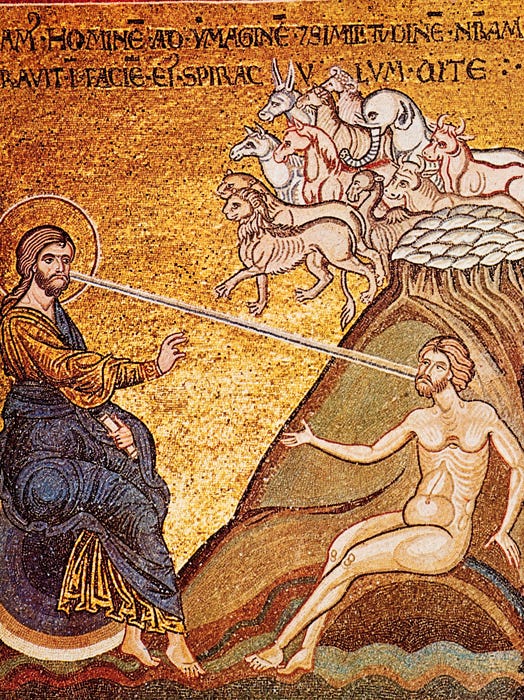Carl Jung: The Ancient View of Soul
Image: William-Adolphe Bouguereau, A Soul in Heaven (1878)
The modern belief in the primacy of physical explanations has led, as already remarked, to a “psychology without the psyche,” that is, to the view that the psyche is nothing but a product of biochemical processes.
As for a modern, scientific psychology which starts from the spirit as such, there simply is none. No one today would venture to found a scientific psychology on the postulate of a psyche independent of the body. The idea of spirit in and for itself, of a self-contained spiritual world-system, which would be the necessary postulate for the existence of autonomous individual souls, is extremely unpopular with us, to say the least.
But here I must remark that, in 1914, I attended at Bedford College, London, a joint session of the Aristotelian Society, the Mind Association, and the British Psychological Society, at which a symposium was held on the question, “Are individual minds contained in God or not?” Should anyone in England dispute the scientific standing of these societies he would not receive a very cordial hearing, for their members include the cream of the British intelligentsia. And perhaps I was the only person in the audience who listened with astonishment to arguments that had the ring of the thirteenth century. This instance may serve to show that the idea of an autonomous spirit whose existence is taken for granted has not died out everywhere in Europe or become a mere fossil left over from the Middle Ages.
If we keep this in mind, we can perhaps summon up courage to consider the possibility of a “psychology with the psyche”—that is, a theory of the psyche ultimately based on the postulate of an autonomous, spiritual principle.
We need not be alarmed at the unpopularity of such an undertaking, for to postulate “spirit” is no more fantastic than to postulate “matter.” Since we have literally no idea how the psychic can arise out of the physical, and yet cannot deny the reality of psychic events, we are free to frame our assumptions the other way about for once, and to suppose that the psyche arises from a spiritual principle which is as inaccessible to our understanding as matter. It will certainly not be a modern psychology, for to be modern is to deny such a possibility. For better or worse, therefore, we must turn back to the teachings of our forefathers, for it was they who made such assumptions.
The ancient view held that the soul was essentially the life of the body, the life-breath, or a kind of force which assumed spatial and corporeal form at the moment of conception, or during pregnancy, or at birth, and left the dying body again after the final breath.
The soul in itself was a being without extension, and because it existed before taking corporeal form and afterwards as well, it was considered timeless and hence immortal. From the standpoint of modern, scientific psychology, this conception is of course pure illusion. But as it is not our intention to indulge in “metaphysics,” even of a modern variety, we will examine this time-honoured notion for once in an unprejudiced way and test its empirical justification.
The names people give to their experiences are often very revealing. What is the origin of the word Seele? Like the English word soul, it comes from the Gothic saiwala and the old German saiwalô, and these can be connected etymologically with the Greek aiolos, ‘quick-moving, twinkling, iridescent’. The Greek word psyche also means ‘butterfly’. Saiwalô is related on the other side to the Old Slavonic sila, ‘strength’. These connections throw light on the original meaning of the word soul: it is moving force, that is, life-force.
“The Greek word psyche also means butterfly.” Image: Psyche Abandoned by Pietro Tenerani (1816)
The Latin words animus, ‘spirit’, and anima, ‘soul’, are the same as the Greek anemos, ‘wind’. The other Greek word for ‘wind’, pneuma, also means ‘spirit’. In Gothic we find the same word in us-anan, ‘to breathe out’, and in Latin it is anhelare, ‘to pant’. In Old High German, spiritus sanctus was rendered by atum, ‘breath’. In Arabic, ‘wind’ is rīh, and rūh is ‘soul, spirit’. The Greek word psyche has similar connections; it is related to psychein, ‘to breathe’, psychos, ‘cool’, psychros, ‘cold, chill’, and physa, ‘bellows’. These connections show clearly how in Latin, Greek, and Arabic the names given to the soul are related to the notion of moving air, the “cold breath of the spirits.” And this is probably the reason why the primitive view also endows the soul with an invisible breath-body.
Image: God breathing life into Adam
According to another primitive view the soul is a fire or flame, because warmth is likewise a sign of life. A very curious, but by no means rare, primitive conception identifies the soul with the name. The name of an individual is his soul, and hence the custom of using the ancestor’s name to reincarnate the ancestral soul in the newborn child. This means nothing less than that ego-consciousness is recognized as being an expression of the soul. Very often the soul is also identified with the shadow, hence it is a deadly insult to tread on a person’s shadow.
Philippe de Champaigne, Saint Augustine (1645)
These indications may serve to show how primitive man experienced the psyche. To him the psyche appears as the source of life, the prime mover, a ghostlike presence which has objective reality. Therefore the primitive knows how to converse with his soul; it becomes vocal within him because it is not simply he himself and his consciousness. To primitive man the psyche is not, as it is with us, the epitome of all that is subjective and subject to the will; on the contrary, it is something objective, self-subsistent, and living its own life.”
Excerpt from Carl Jung, Collected Works 8








